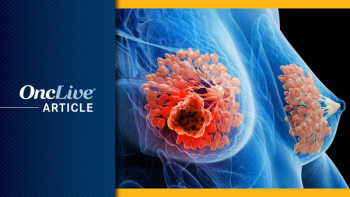
Liquid Biopsy for NSCLC: Emerging Developments
Transcript:
Geoffrey R. Oxnard, MD: The last question is, will we be using liquid biopsies to find cancer before it’s diagnosed? Should we be sending a blood test when we see a patient who presents with a lung nodule? And the easy answer is, “No, it’s not ready for that right now.” But when a patient doesn’t have a diagnosis of cancer, what they want is a diagnosis. They want a path specimen. They want a tissue to tell them, is cancer present? Yes or no? And a liquid biopsy does not replace that. In fact, we know about cases where there are obvious mutations floating around in the blood and they’re not from cancer at all, they’re just benign variants that the patient’s white cells are producing. So, we are not yet ready to use these tests to find cancer before it’s diagnosed. They really are tests that are only to be used in patients who have cancer, where this is added information telling us what direction to go next.
Sandip Patel, MD: One of the major unmet needs with liquid biopsy is the ability to get the sensitivity, the depth, such that we can utilize these assays in earlier stage disease more effectively—stage 1, stage 2 cancers—and ultimately the cancer prevention setting for patients who are getting serial low-dose CT scans for non—small cell lung cancer. As these assays continue to improve, the potential to use these not only to monitor for malignant versus benign lesions but also for patients who undergo resection, early recurrence, will be hugely important, as these assays continue to improve in their ability to detect these aberrations at a very low mutant allele fraction or percent cell-free DNA level. Additionally, as these panels continue to broaden, the ability to predict immunotherapeutic response or tumor mutational burden will become increasingly viable. And this is particularly important in non–small cell lung cancer, where the use of targeted therapies and immunotherapies has revolutionized the field.
Geoffrey R. Oxnard, MD: The simple truth is that this is part of modern oncology, and we need to be ready to adopt this. We need to know the strengths of these assays, which is their convenience—they’re compelling. We need to know the weaknesses of these assays: that they are not perfectly sensitive, that they do have some artifact and some errors sometimes. And we need to press our partners in industry to move these assays forward, to make them better and better for our needs. That means turnaround time, that means clean reporting, that means readable reports, and that means being able to order them, to reorder them, in patients where it’s needed. We need them to be cost-effective to be able to do that. But this is part of modern oncology. It’s exciting. It’s a little bit daunting, but it’s exciting. And so, make sure that your clinic has kits available and has tubes available so your patients can tap into this progress now in lung cancer and perhaps wherever it’s going in the future as part of modern oncology evolving.
Sandip Patel, MD: For me, the future of liquid biopsy really relates to the strengths and the technology and the ability of a blood test to detect the majority of cancer-related aberrations that may be affecting a patient, and to do so serially over time without an undue risk to the patient with biopsy. This will best allow us to assay a patient on targeted therapy to have early detection of resistance mutations, such that we can intervene on these mutations early to a patient’s benefit and also have the ability to more completely survey a patient’s cancer genome, so we can better predict whether or not an immunotherapeutic approach may benefit our patients with non—small cell lung cancer. And so, I think over time, cell-free DNA and liquid-based approaches will be beneficial to our patients, not only at diagnosis but also for early on-treatment disease resistance monitoring. And the ability to use these assays to detect recurrence, or for screening of patients with high-risk disease, is one application of this technology that I think will be utilized in the future.
Transcript Edited for Clarity






































